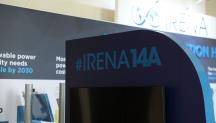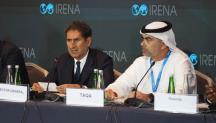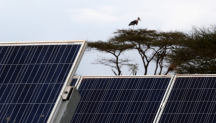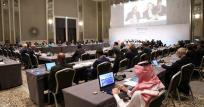
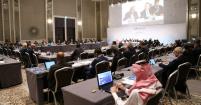
Optimism and Opportunity Evident as Delegates Gather for IRENA9A
Newsletter
A sense of eagerness to work together to build the energy system of the future is prevailing among more than 1200 delegates who are gathering for the Ninth Session of the IRENA Assembly in Abu Dhabi. Representatives from more than 160 countries, the private sector and civil society are gathering to discuss key issues in the global energy transition and chart the way forward for the Agency against a backdrop of remarkable progress on deployment.
Although tomorrow is the first official day of IRENA9A, delegates were greeted with a full schedule of roundtable discussions, workshops, dialogues and meetings.
SIDS Ministerial
Working with island states to develop clean, sustainable sources of energy for their populations, while eliminating costly and wasteful foreign payments for fossil fuels and improving energy security, is a critical area of focus for IRENA.
Since its inception, IRENA has been working with SIDS through initiatives like SIDS Lighthouses Initiative (LHI), which has helped to drive a remarkable growth of renewable energy in SIDS in less than a decade. IRENA's SIDS Ministerial builds on the priority areas identified for the next phase of the SIDS Lighthouses Initiative and discusses challenges, opportunities and practical solutions to accelerate energy transformation in SIDS.
Ministers and delegates noted the rapid growth of renewables in SIDS but urged that more must be done given the existential threats of climate change, and also as a means to reduce costly fuel imports.
Legislator’s Forum
The IRENA Legislators Forum brings together a growing network of parliamentarians with an interest in accelerating renewable energy uptake. Parliamentarians are central to setting policy and regulatory frames for renewables, designing long-term development strategies, ensure the necessary budget to help accelerate the energy transition and raise awareness with the public.
This year’s debate focused on parliamentary actions to accelerate the energy transformation and implement UN’s Sustainable Development Goal on Energy (SDG7). Delegates issued a strong call to accelerate the energy transformation, noting that a strong policy framework across all counties is needed in order to advance development through renewable energy.
Delegates particularly noted that renewable energy solutions are not only essential to SDG 7 but are also a key enabler for realising the 2030 Sustainable Development Agenda as a whole.
The Legislator’s Forum is part of IRENA’s ongoing engagement with parliamentarians, through its Parliamentary Network.
Solar Opportunities for Developing Cities
The Solar Opportunities for Developing Cities session looks at various options to advance the development of cities through solar technologies. Delegates learnt about a range of potential policy design use cases and benefits of deploying rooftop simulators. The event highlighted successful examples where these simulators have been used to benefit the urban planning process and outlined IRENA’s ongoing efforts to demonstrate a rooftop solar simulator in two cities in developing countries.
Delegates in countries with energy challenges particularly noted the value of rooftop solar in order to power essential services. Technologies such as satellite imagery were also highlighted as revolutionary to solar energy prospecting.
African Ministerial
The African Ministerial is a gathering of African and international leaders to identify the opportunities and challenges of creating the energy system of the future, to meet Africa’s rapidly-growing energy needs, drive business growth, and advance sustainable development. IRENA Director-General Adnan Z. Amin kicked off the meeting by noting that IRENA’s data finds that renewable energy can deliver a quarter of Africa’s energy needs by 2030.To a packed audience, the Director-General also presented the screening of a video specially made for IRENA by Former State Secretary, German Federal Ministry for Economic Affairs and Energy, Rainer Baake. Mr. Baake visited Botswana, Namibia and Zimbabwe to examine the role that renewable energy is playing in driving the socioeconomic development of the region.
Legislator’s Forum
Delegates were given an overview of IRENA’s work in Africa, which includes initiatives like the Africa Clean Energy Corridor, Renewables Readiness Assessments, and the Entrepreneurship Support Facility.
Through a series of lively discussions, delegates stressed the need to treat access to energy as a human right, and to its centrality to development across the continent.
Sustainable Energy Solutions in Situations of Displacement
IRENA has been working with UNHCR to examine renewable energy solutions for the provision of access to reliable and affordable electricity to refugees, host communities and UNHCR operations. This event explored current challenges that impede energy access in humanitarian settings towards the vision of “safe access to affordable, reliable, sustainable and modern energy services for all displaced people by 2030”.
There are around 68.5 million people displaced worldwide and among them are about 25.4 million refugees, of which over half are under the age of 18. IRENA previously interviewed the head of UNHCR in the UAE, Toby Harward, about the opportunities of renewables in refugee camps.
Despite the potential of renewables, energy is a not a formal priority in humanitarian scenarios, nor are displaced people included in improving energy access efforts in most humanitarian settings. There is, therefore still a long way to go before the full potential of renewables in humanitarian settings is realised, delegates noted.
Public Private Dialogue
IRENA convened this dialogue for the first time last year, and its response to two white papers on investments and community energy were very favorably received by the Assembly during the Eighth Session.
Delegates noted that momentum for private sector engagement in advancing renewables is growing, as evidenced by the Inter Parliamentary Union resolution - “Engaging the private sector in implementing the SDGs”, which highlights the role of parliaments in stepping-up engagements around the SDGs. The adoption of the resolution sends an important signal that legislators recognize the need for creating an enabling environment for private sector investments in renewable energy.
Delegates also discussed a broad variety of rationales for pursuing 100% renewable energy, with socio-economic benefits highlighted as one of the key drivers particularly among regional and local governments. Achieving these targets will create millions of new jobs, stimulate economic growth, and bring important health benefits through cleaner water and air.
High-Level Meeting on Renewable Energy in Latin America
IRENA has been active in Latin America for a number of years. The region has some of the world’s most dynamic renewable energy markets, with more than a quarter of primary energy coming from renewables, twice the global average, and IRENA’s tools and support, including REmap studies, power system flexibility, enabling policy and regulation, project development and finance, and its IRENA’s Clean Energy Corridor of Central America (CECCA) initiative, all aim to broaden the pathways for expanded renewables deployment. Policymakers were given the opportunity to comment on the Regional Action Plan: Accelerating Renewable Energy Deployment in Latin America – a plan that identified key technical advisory and capacity building needs to help address barriers to renewables adoption.
Delegates also noted the ambitious renewable energy targets in the region, with several countries moving into the top 10 renewable energy markets in the world.
.jpg?rev=52674ec6b7d84bd2b148530cb0d45efd&w=216&h=123&as=1&bc=ffffff&cc=1&hash=0624A9F4CA36183CAF239659CDFF709E)
